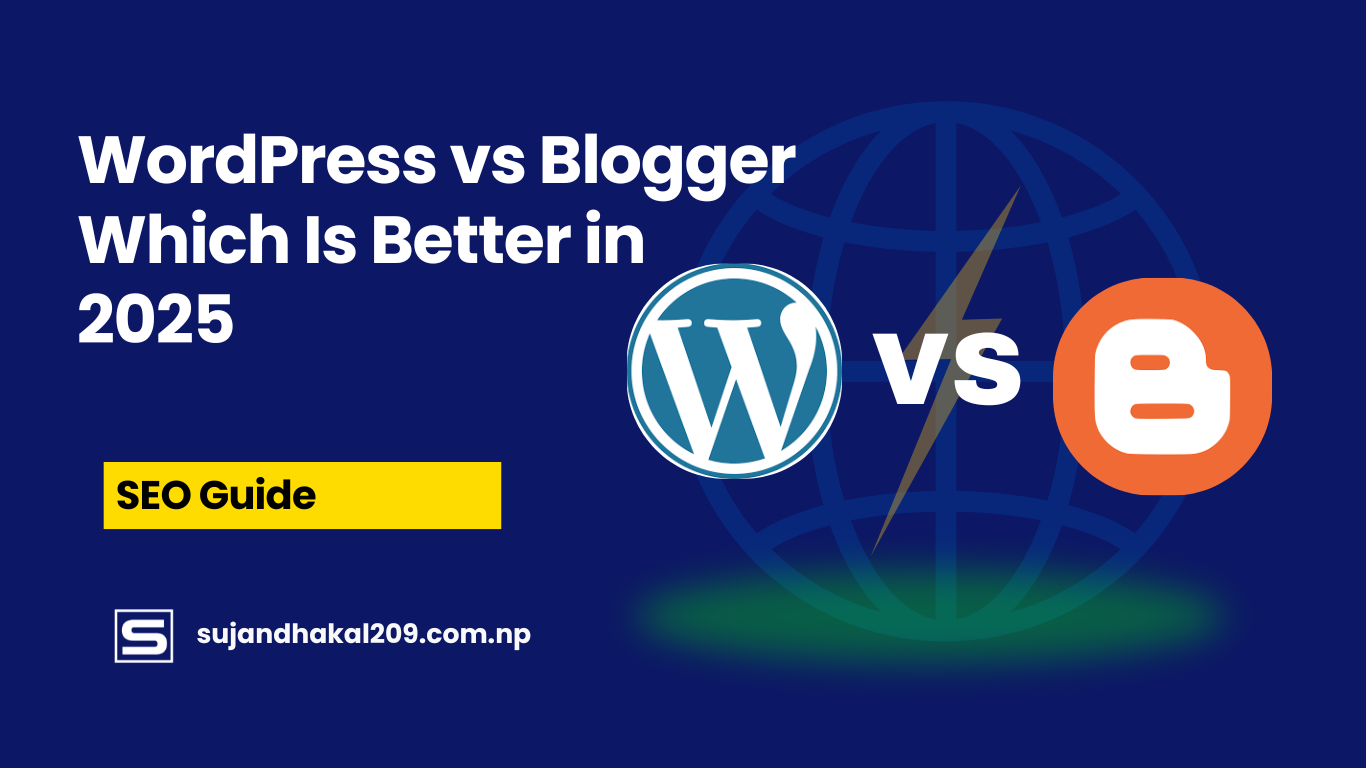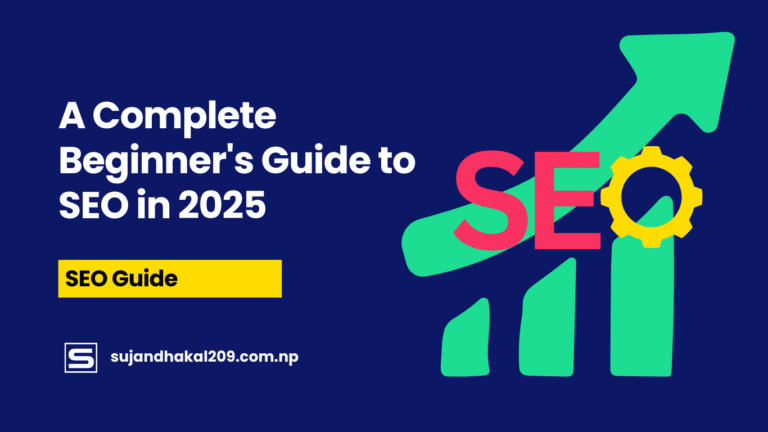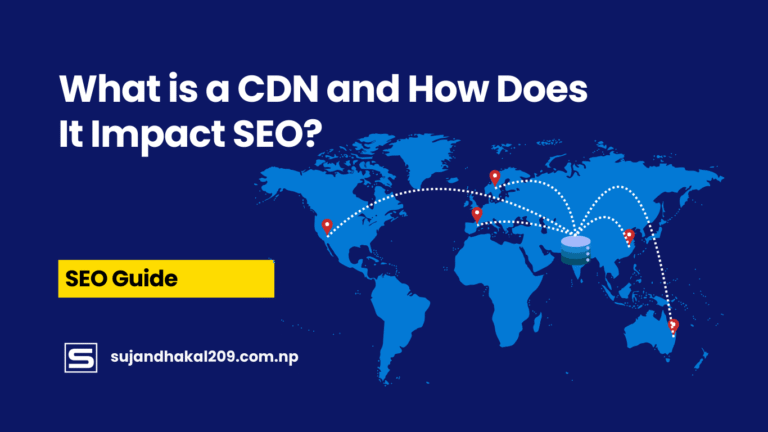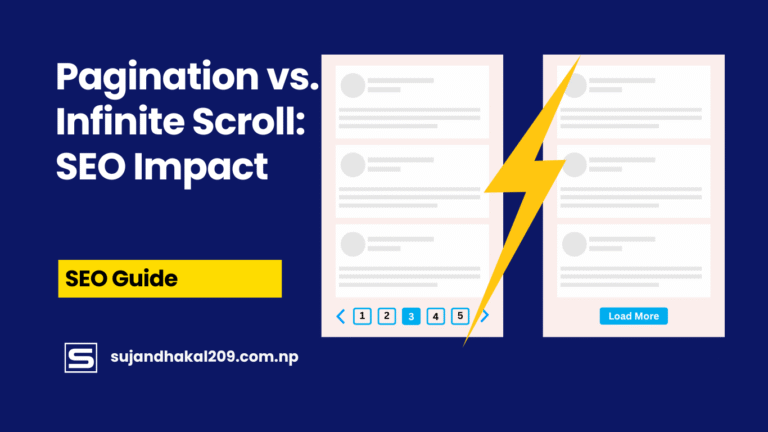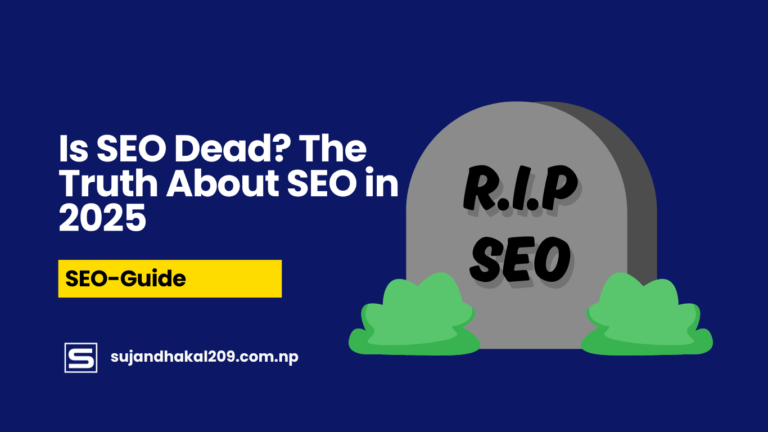In the ever-evolving digital world of 2025, choosing the right blogging platform can make or break your success online. Whether you’re starting a personal blog, building a business website, or launching a monetized content empire, your platform choice matters. Two giants still stand tall: WordPress and Blogger. But with technology advancing and user needs changing, which one is better suited for today’s demands? Let’s dive deep into a full comparison to help you make the smartest decision.
Introduction
If you’re serious about blogging or content creation in 2025, understanding the fundamental differences between platforms is crucial. WordPress and Blogger have been dominating the blogging scene for decades. Each offers unique benefits, but each also comes with its own set of limitations. Whether you’re chasing high SEO rankings, building an online business, or just sharing personal experiences, picking the right platform could heavily impact your growth.
Choosing blindly without evaluating factors like ownership, customization, SEO performance, monetization options, and future scalability is like building a house without a blueprint. Let’s peel back the layers and see how these platforms stack up against each other today.
What is WordPress?
A Brief History of WordPress
WordPress started its journey in 2003, originally envisioned as a simple blogging tool by Matt Mullenweg and Mike Little. Over time, it evolved into a full-fledged content management system (CMS). As of 2025, WordPress powers over 43% of all websites globally, making it a juggernaut in web development and blogging.
The platform is open-source, which means anyone can modify and improve the software. With countless developers and designers contributing, WordPress has grown from a blogging tool into a robust website creation platform capable of powering everything from simple blogs to massive e-commerce sites.
How WordPress Works in 2025
Today, WordPress is more flexible than ever. You have two options:
- WordPress.org: Self-hosted, fully customizable with thousands of plugins and themes.
- WordPress.com: Hosted version with more restrictions but easier setup.
WordPress.org remains the gold standard for serious bloggers, offering unparalleled control over every aspect of your site. In 2025, it’s easier than ever to integrate AI tools, set up eCommerce, optimize SEO, and create complex membership sites—all without touching a line of code (unless you want to!).
What is Blogger?
A Brief History of Blogger
Blogger was launched back in 1999 by a small company called Pyra Labs and was later acquired by Google in 2003. It became one of the first mainstream blogging tools, offering a simple, free way to publish content online. Blogger made blogging accessible to millions of people who didn’t have coding skills or money to invest in expensive website setups.
However, despite Google’s ownership, Blogger hasn’t seen significant innovation over the past decade compared to competitors like WordPress or newer CMS platforms.
How Blogger Works in 2025
Blogger still offers a free, straightforward blogging solution. Your blog is hosted on Google’s servers, making it highly reliable in terms of uptime and speed. You can create a blog quickly by simply logging into your Google account and setting up a blog through Blogger’s dashboard.
However, customization remains limited. You can choose from a variety of basic templates and make minor tweaks, but creating a unique or advanced website design is still a challenge compared to WordPress.
While Blogger ensures ease of use, it may not provide the tools and flexibility needed for scaling a professional blog in 2025.
Key Differences Between WordPress and Blogger
Ownership and Control
When it comes to ownership, WordPress wins hands down. If you choose WordPress.org, you own your website entirely—every file, every database, every customization is yours to keep. You can move your site anywhere or modify it however you like.
On the other hand, with Blogger, Google technically owns your content. They can suspend or delete your blog if they find it violates their policies. This lack of true ownership can be risky, especially if you’re investing time and money into growing your brand.
Imagine building your dream home, only to find out you don’t own the land it’s built on—that’s what using Blogger feels like.
Customization and Flexibility
WordPress provides unlimited customization. You have access to:
- 50,000+ plugins
- Tens of thousands of free and premium themes
- Custom CSS and PHP editing
- Integration with third-party services and APIs
Blogger, in contrast, offers basic customization through gadgets and a handful of templates. It’s enough for personal blogs but falls short for professional websites or brands that need unique designs.
SEO Capabilities
Both platforms allow you to optimize your blog for SEO, but WordPress offers far more powerful tools. Plugins like Yoast SEO, Rank Math, and All in One SEO make it easy to manage on-page SEO, technical SEO, and even schema markup.
Blogger has basic SEO settings like custom meta tags and mobile optimization but lacks advanced capabilities. If you’re serious about ranking #1 in Google in 2025, WordPress gives you a significant head start.
WordPress Pros and Cons
WordPress Advantages
- Full Ownership: Your content is truly yours.
- Unlimited Customization: Design your site however you want.
- Superior SEO Tools: Maximize your visibility online.
- Extensive Plugin Ecosystem: Add new features without coding.
- Scalability: Grow from a blog to a full eCommerce store.
- Community Support: Thousands of forums, YouTube tutorials, and developers available.
WordPress lets you build a personal blog, a news magazine, or even a multi-vendor marketplace—all with the same core platform.
WordPress Disadvantages
- Learning Curve: Beginners might feel overwhelmed initially.
- Costs: Hosting, premium themes, and plugins can add up.
- Maintenance: Regular updates for themes, plugins, and WordPress core are necessary.
- Security Risks: Open-source nature means you need good security practices.
However, with the right hosting and security plugins, you can manage most of these drawbacks effectively.
Blogger Pros and Cons
Blogger Advantages
- Free Hosting: Blogger offers free hosting with unlimited bandwidth and storage within reason.
- Simple to Use: Even if you have zero technical knowledge, you can set up a blog within minutes.
- Integrated with Google: Blogger is tightly integrated with Google services like AdSense and Analytics, making monetization and tracking easier.
- Reliable Hosting: Since it’s hosted on Google’s servers, you rarely have to worry about downtime.
- Security: Google handles all security updates and maintenance, so you don’t have to lift a finger.
If you’re looking for a platform that requires minimal effort and zero cost, Blogger fits the bill perfectly in 2025, especially for hobbyist bloggers or personal diary-style blogs.
Blogger Disadvantages
- Limited Customization: You get basic themes and few design options.
- Ownership Concerns: You don’t own your blog — Google does.
- Outdated Interface: Blogger’s dashboard and features feel a bit antiquated in 2025.
- Poor Scalability: Expanding a Blogger site into something beyond a personal blog is extremely challenging.
- SEO Limitations: Limited ability to fine-tune SEO settings compared to WordPress.
For professional blogging, business branding, or serious monetization efforts, Blogger can feel very limiting.
Ease of Use: Which Platform is More Beginner-Friendly?
Setting Up a Blog on WordPress
Setting up a WordPress blog involves a few more steps than Blogger but offers more flexibility:
- Choose a Hosting Provider: Select a reliable host like Bluehost, SiteGround, or Hostinger.
- Install WordPress: Most hosting providers offer one-click installation.
- Pick a Theme: Choose from thousands of free and premium themes.
- Install Essential Plugins: Add SEO, security, backup, and performance plugins.
- Customize Your Site: Use the Gutenberg block editor or a page builder like Elementor.
Though it sounds complicated, modern hosting services simplify the process tremendously. Within an hour, even a beginner can launch a professional-looking blog.
Setting Up a Blog on Blogger
On Blogger, it’s as easy as:
- Log in with Your Google Account.
- Click “Create New Blog.”
- Choose a Template.
- Start Writing!
Blogger wins in sheer ease of initial setup. It’s nearly foolproof, making it ideal for users who want to start blogging immediately without worrying about design or technical configurations.
However, while Blogger is easier to start with, WordPress offers more long-term value and professional growth opportunities.
Design and Customization Options
Themes and Templates on WordPress
WordPress blows Blogger out of the water when it comes to design flexibility. You can choose from:
- 10,000+ Free Themes: Available directly from the WordPress repository.
- Premium Themes: Purchased from marketplaces like ThemeForest or Elegant Themes.
- Page Builders: Tools like Elementor, Beaver Builder, and Divi allow you to design your site visually without coding.
- Custom Development: Hire developers to create custom themes tailored exactly to your brand.
Whether you’re launching a sleek portfolio, an elegant food blog, or a complex membership site, WordPress can accommodate any design dream.
Themes and Templates on Blogger
Blogger offers a limited set of basic templates with customization options like changing colors, fonts, and basic layout tweaks. While there are third-party templates available, they’re fewer and far less customizable compared to WordPress.
In 2025, Blogger’s templates feel outdated and less responsive, which can affect your site’s appeal and mobile performance — crucial factors for SEO and user engagement today.
If brand identity, aesthetics, and UX (user experience) are important to you, WordPress is the clear winner.
SEO Performance Comparison
SEO on WordPress
WordPress is built with SEO in mind. Some key advantages:
- Advanced SEO Plugins: Yoast SEO, Rank Math, SEOPress help optimize titles, meta descriptions, XML sitemaps, structured data, and more.
- Permalink Control: Customize your URL structure for better SEO.
- Fast Load Times: With proper hosting and caching plugins, your WordPress site can load incredibly fast—a major SEO ranking factor.
- Mobile Optimization: Most WordPress themes today are fully responsive and mobile-friendly.
- Schema Integration: Easily add structured data for rich snippets.
With WordPress, achieving top Google rankings becomes a lot more feasible, provided you apply good SEO practices consistently.
SEO on Blogger
Blogger offers basic SEO settings like:
- Editable titles and meta descriptions
- Custom URLs
- Mobile-friendly templates
However, it lacks advanced SEO control:
- No plugins for comprehensive on-page SEO management
- Limited ability to edit robots.txt and sitemap configurations
- Weak support for structured data
In 2025, SEO is more competitive than ever, and the limited SEO capabilities on Blogger can significantly hinder your ability to compete with WordPress sites.
Monetization Opportunities
Earning Potential with WordPress
WordPress offers endless monetization options:
- Affiliate Marketing: Seamlessly integrate affiliate links with blog posts.
- Sponsored Posts: Attract high-paying brands due to your site’s flexibility and professionalism.
- Google AdSense: Easily integrate ads without restrictions.
- Membership Sites: Sell memberships, online courses, and exclusive content.
- eCommerce: Launch full-scale online stores using WooCommerce.
Because you own your site, you’re in complete control of monetization strategies, ad placements, pricing models, and user experience optimization.
Earning Potential with Blogger
Blogger mainly supports Google AdSense monetization. You can place ads on your site and earn revenue per click or impression.
While you can technically promote affiliate products, the lack of professional design and customization might lower your conversion rates compared to WordPress blogs.
In 2025, if your goal is serious money-making through blogging, WordPress far outshines Blogger.
Security and Updates
Security Features on WordPress
Security in WordPress is a shared responsibility between the platform, hosting provider, and site owner. In 2025, WordPress offers robust security features, including:
- Security Plugins: Tools like Wordfence, Sucuri, and iThemes Security provide firewalls, malware scanning, and login protection.
- Automatic Updates: Core updates are automatic for minor versions, and many plugins/themes can be set to auto-update.
- Two-Factor Authentication: Easily implement 2FA to enhance login security.
- SSL Certificates: Most hosts offer free SSL certificates, improving security and SEO.
However, because WordPress is open-source and widely used, it’s a frequent target for hackers. But with good practices—strong passwords, updated plugins, regular backups—you can minimize the risks dramatically.
Security Features on Blogger
With Blogger, Google handles all security aspects for you:
- No Need for Manual Updates: Google automatically updates and maintains the platform.
- Integrated SSL Certificates: Free SSL for every blog.
- High Uptime and Reliability: Hosted on Google’s secure servers.
If you prefer a “set it and forget it” approach to security, Blogger wins. However, for users who need advanced security configurations for professional or eCommerce sites, WordPress offers deeper control.
Cost Comparison: WordPress vs Blogger
WordPress Pricing Breakdown
WordPress.org itself is free, but running a WordPress site has associated costs:
- Domain Name: $10–$20 per year
- Hosting: $3–$30 per month (depending on provider and plan)
- Premium Themes: Optional, $30–$100 one-time
- Plugins: Free or $50–$200/year depending on premium plugins
- Developer Fees: Optional if you hire experts
In total, expect to spend around $60–$300 per year for a professional WordPress blog. It’s an investment, but one that offers unmatched flexibility and growth potential.
Blogger Pricing Breakdown
Blogger is completely free:
- Hosting: Free
- Platform Access: Free
- Templates: Free (limited options)
- Domain Name: Optional if you want a custom domain ($10–$20/year)
If you want to run a blog on a shoestring budget or just test blogging as a hobby, Blogger is the clear winner.
However, the saying goes, “You get what you pay for,” and Blogger’s limitations in customization and monetization can ultimately cost you opportunities.
Community Support and Resources
WordPress Community and Plugins
WordPress boasts one of the largest and most active communities in the world:
- Support Forums: Official WordPress forums, Reddit groups, Facebook groups
- Tutorials and Courses: Thousands of free and paid learning resources
- Plugins and Themes: Developed by a thriving ecosystem of professionals
- Meetups and WordCamps: Local and international events for WordPress enthusiasts
No matter your problem, there’s likely a plugin, guide, or community member who can help.
Blogger Support and Resources
Blogger support mainly consists of:
- Google Help Documentation: Basic troubleshooting guides
- Community Forums: Less active compared to WordPress forums
- YouTube Tutorials: Some creators offer Blogger how-to videos
The Blogger community is much smaller and less active in 2025, making it harder to find help for niche problems.
Future Outlook: WordPress and Blogger in 2025 and Beyond
Trends to Watch
- AI Integration: WordPress is leading with smart content creation tools, SEO optimization plugins powered by AI, and predictive analytics. Blogger lags far behind in this area.
- Headless CMS Growth: WordPress is adapting fast with headless capabilities for faster, more dynamic websites.
- Monetization Ecosystems: WordPress is building integrations for NFTs, crypto payments, and advanced membership features.
- Blogger’s Stagnation: Very few major updates have been rolled out by Google, and there’s growing speculation whether Blogger will survive the next few years.
In short, WordPress is adapting to modern web demands. Blogger remains a simple, nostalgic option but risks obsolescence unless Google injects serious innovation.
Final Verdict: Which One Should You Choose in 2025?
When weighing all factors—ownership, customization, SEO performance, monetization, support, and future-proofing—WordPress is the superior choice in 2025.
Sure, Blogger might appeal to absolute beginners or casual writers who want a no-fuss blogging platform. But if you’re serious about growing your brand, ranking high in search engines, earning significant revenue, and building a long-term digital asset, WordPress gives you the tools, flexibility, and control to make it happen.
Choosing Blogger is like riding a bicycle—great for a smooth path in the park. Choosing WordPress is like owning a high-performance car—you can go anywhere, however fast you want, with the right upgrades.
Conclusion
In 2025, your choice between WordPress and Blogger boils down to your goals. If you’re just starting out, exploring blogging casually, and want something free and super simple, Blogger might be enough.
But if you want to create a professional, scalable, SEO-optimized blog that you fully own and control, WordPress is hands down the better platform.
The internet is more competitive now than ever. Choose a platform that will not just get you started, but grow with you as you evolve. WordPress offers that journey—Blogger, unfortunately, does not.
FAQs
Is Blogger still worth using in 2025?
Blogger is still a good option for hobbyists and casual bloggers who want a free, simple platform. However, for professional or business blogging, it falls short compared to WordPress.
Can I move from Blogger to WordPress later?
Yes, you can migrate from Blogger to WordPress using import tools, but it can be complex, especially with media files and SEO structures. It’s better to start with WordPress if you plan to grow.
Which platform is better for SEO in 2025?
WordPress is significantly better for SEO in 2025. It offers advanced SEO plugins, customizable permalinks, structured data support, and better performance optimization options.
Is WordPress hard to learn for beginners?
There’s a small learning curve, but modern WordPress tools, tutorials, and drag-and-drop page builders make it easier than ever for beginners to launch and manage their websites.
Which is better for monetizing a blog: WordPress or Blogger?
WordPress is far superior for monetization. You can integrate multiple revenue streams, from ads and affiliate marketing to online stores and membership programs.

